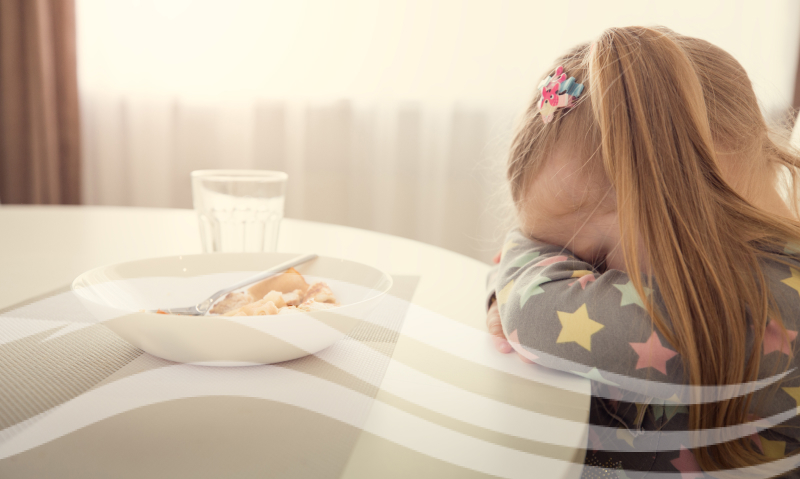Oh, the joy of the holidays. Spending time with beloved family members, gifts, and all of the delicious and delectable savory food and sweet treats. While this might sound like absolute heaven to many adults, the latter part of this might be the source of stress or angst for kids with food anxiety.
But this doesn’t mean you can’t look forward to some fun foods this coming holiday season. The secret is about giving your picky eater a bit of control and including them in the planning process. Read on for some helpful tips to help your child move through the holiday season without their food anxiety taking over.
Help your child overcome their food anxiety this holiday season.
We all know what it is like to have certain foods that we dislike. For some, it might mean a strong dislike for mushrooms or tomatoes. For others, it might mean an aversion to condiments like ketchup or mustard. But when it comes to food anxiety, the dislike for foods is much more than a pickiness that most kids will outgrow as time goes on.
Though severe food anxiety in kids is rare, it is a condition many parents face, especially those with autistic children. And if your child has food anxiety or is an extremely picky eater, it can make the holidays a bit of a challenge.
If you have a picky eater or a child with food anxiety, try some of our tips below to make mealtime during the holidays a bit easier this year.
1. Talk about mealtime when it isn’t mealtime.
We’ve discovered that the best time to talk about foods and nutrition is when food isn’t front and center and when we’re not hungry. So, instead of talking to your kids about the importance of nutrition when they’re hungry but facing a food they have never tried before, take some time during another part of the day.
Discuss the benefits of eating a wide variety of foods. Help teach your child about the benefits of vitamins and minerals, what foods they can be found in, and how those vitamins and minerals help their teeth, gums, and bodies. Make sure these conversations aren’t one-and-done discussions, either. Talking about our overall health and nutrition should be part of ongoing discussions at home.
2. Let your child be part of meal planning and grocery shopping.
Though we understand that parents need to lay the foundation for good overall health and need to take responsibility for what is put on the table, that doesn’t mean that your kids can’t be part of the process.
Make meal planning a family activity where everyone gets to make a special request about what they’d like to see on the breakfast or dinner table. Help all family members to understand what goes into a healthy and balanced meal, and lay out a meal calendar that will work for your family. Then, include your child in the grocery shopping process, giving them choices between certain brands, fruits, vegetables, etc.
3. Speak neutrally when it comes to talking about food.
We know how exciting it can be when you get your picky eater to try something new. But over-praising them for eating something new or trying something they said they wouldn’t try may increase anxiety by bringing too much unnecessary attention to the problem. Instead, stay neutral and allow your child to try something at their own pace without creating an unnecessary ruckus.
4. Don’t force a child with food anxiety to try a food that they don’t want to.
Though getting your picky eater to try something new can be frustrating, understand that food anxiety can worsen when not managed appropriately. This isn’t about giving your child complete control, either. Instead, it is about giving your child choices.
If they don’t like carrots, for example, seek other healthy and crunchy vegetables as an alternative. Offer them options in the produce section at the grocery store. But help your choice understand too that if they don’t select a healthy fruit or vegetable to eat, they don’t get to have ice cream or cookies and milk as an alternative.
5. Don’t punish your child by holding back on the feel-good foods.
We all have foods that make us feel better. We call these foods “comfort foods” because they make us feel good. While these foods shouldn’t necessarily be the final answer of your child’s daily diet, don’t keep them away altogether. If your child likes macaroni and cheese, then, by all means, let them have it! But, look for a healthy side item like green beans or steamed broccoli that gives them the additional nutrients they need to round out their diet.
6. Come up with some holiday recipes that your entire family will love.
Many kids with autism and food anxiety appreciate a routine, and that routine can even apply when it comes to the holidays. Whether you try some of our recommended holiday recipes we think your whole family will love, or you come up with some on your own, let your child offer some suggestions on holiday food favorites that you make together year after year. This can provide a bit of comfort and give your anxious eater something to look forward to.
Share your holiday food suggestions with the team at Steven A. Lang, DDS!
We’re always looking for holiday food suggestions to share with our patients, whether they have a picky eater, a child with food anxiety, or just want something fun to share with their families. So this year, share some of your ideas with us at your annual dental cleaning and oral evaluation.
And if you are overdue for that appointment and haven’t scheduled it with our office, now is the time to request an appointment. The team at Steven A. Lang, DDS, offers complete family dental care in Miami Valley, Ohio, and can’t wait to see you and your family this holiday season.

